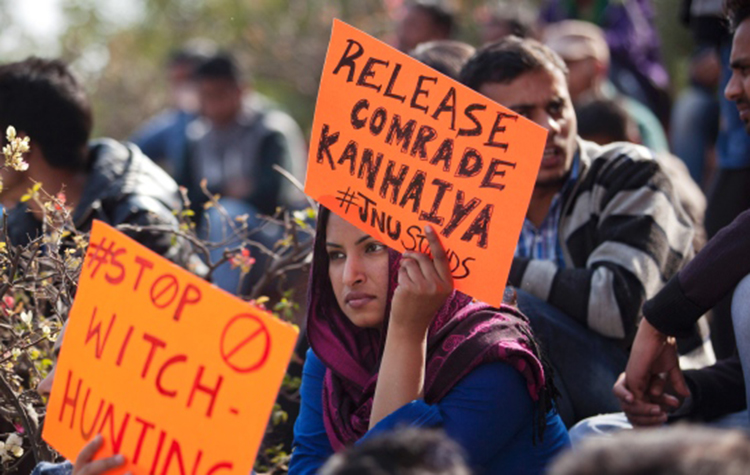(Bangkok, 17 February 2016) – The Asian Forum for Human Rights and Development (FORUM-ASIA) strongly condemns the use of colonial-era sedition laws to stifle freedom of expression, including the arrests of the former Delhi University lecturer SAR Geelani and a student leader at Jawaharlal Nehru University, New Delhi on sedition charges under section 124A of the Indian Penal Code.
On 12 February, Delhi Police arrested Kanhaiya Kumar, president of Jawaharlal Nehru University (JNU) Student Union on charges of sedition. The arrest followed raids on several JNU hostels after reports emerged of alleged ‘anti-national’ slogans during a public meeting on the JNU campus on 9 February protesting the execution of Afzal Guru. Afzal Guru was convicted of an attack in 2001on India’s Parliament and executed on 9 February 2013. While students claim the public meeting was organised to protest capital punishment and the ‘judicial killing’ of Afzal Guru, Delhi Police alleged students were engaging in ‘anti-national’ activities. Kanhaiya’s arrest has been condemned by civil society groups and academic fraternities across India.
On 16 February, former Delhi University lecturer SAR Geelani was also arrested and charged with sedition in relation to an event organised in Delhi on 10 February where alleged ‘anti-national’ slogans were raised. He has been sent to 2-day remand. Geelani was arrested and charged in connection with the 2001 attack on the Indian Parliament but was later acquitted by the Delhi High Court in 2003.
In the recent past, disturbances have been witnessed in several academic institutions across the country, like at the University of Hyderabad, the Ambedkar-Periyar Study Circle at IIT Madras, the Film and Television Institution of India (FTTI), and Pune, creating an atmosphere of unrest.
India’s sedition laws were enacted in 1870 by the colonial Government to clamp down on freedom fighters, political dissenters and other critics. FORUM-ASIA believes they fall short of international human rights standards and are a barrier for free speech in the country. The British Government abolished similar sedition laws in 2009, while they remained in force in India and other Commonwealth countries. Section 124A of the Indian Penal Code defines sedition as “any attempt by words, either spoken or written, or by signs, or by visible representation, or otherwise to bring into hatred or contempt the lawful government and prescribes punishment of life imprisonment and fine”. This provision has been systemically used against human rights defenders, writers, and political opponents resulting in shrinking space for lawful dissent and critique.
“Sedition laws are against Indian tradition of a diverse and pluralistic society. For a robust and vibrant democracy to flourish, the Government of India must stop criminalising critical voices and respect legitimate criticism and democratic disagreement”, says Evelyn Balais-Serrano, Executive Director of FORUM-ASIA. “It is the duty of the State to protect the freedom of expression of all people”.
The right to freedom of speech and expression is guaranteed under the Indian Constitution (article 19.1.a) and prohibits unreasonable restrictions. India’s sedition laws are in direct contrast with this basic fundamental right. The Supreme Court of India, in 1962,framed safeguards against the abuse of the sedition laws and ruled that seditious speech and expression may be punished only if the speech is an ‘incitement’ to ‘violence’, or ‘public disorder’ (Keder Nath Singh vs. State of Bihar, 1962 AIR 955). Subsequent governments have been bypassing these safeguards and abusing the sedition laws to target legitimate criticism, dissent, and protests, indicting activists and writers.
In 2012, the Indian Government carried out mass arrests and lodged more than 50,000 First Information Reports (FIRs) against demonstrators involved in anti-nuclear protests at Kudankulam, Tamil Nadu. Some 7,000 of these protesters were charged with sedition. Human rights defenders and writers have also been arbitrarily charged with sedition, including writer Arundhati Roy and social activist Binayak Sen. In September 2012, Aseem Trivedi, a prominent cartoonist, was booked under charges of sedition for a series of anti-corruption cartoons published in a national newspaper.
FORUM-ASIA urges the Government of India to take immediate steps to withdraws edition charges imposed on activists and writers, and repeal the sedition laws as they contravene India’s human rights commitments nationally and internationally.
For further inquiries, please contact:
South Asia Program, FORUM-ASIA, [email protected]



